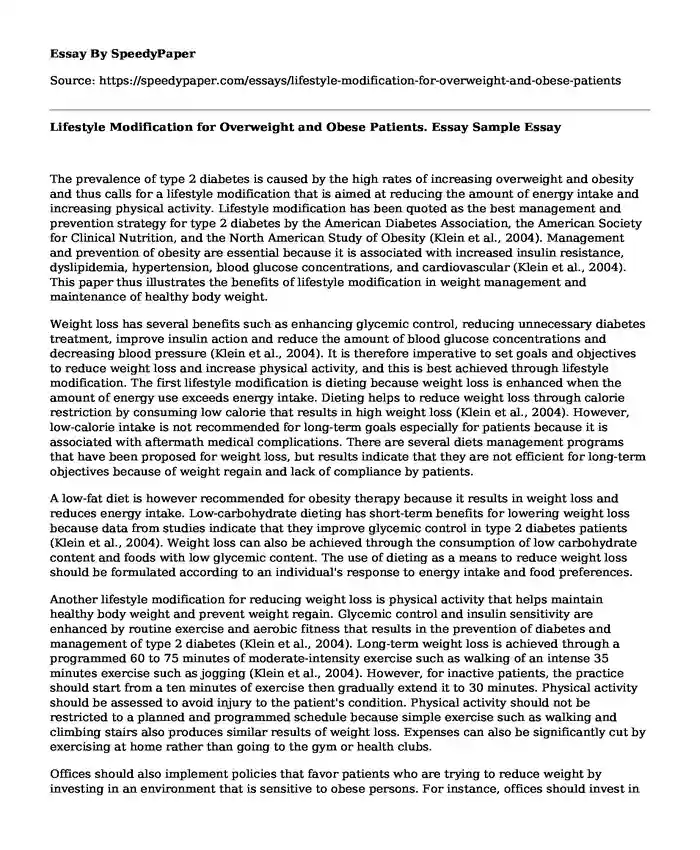
| Type of paper: | Research paper |
| Categories: | Healthcare Diabetes Diet Nutrition |
| Pages: | 3 |
| Wordcount: | 793 words |
The prevalence of type 2 diabetes is caused by the high rates of increasing overweight and obesity and thus calls for a lifestyle modification that is aimed at reducing the amount of energy intake and increasing physical activity. Lifestyle modification has been quoted as the best management and prevention strategy for type 2 diabetes by the American Diabetes Association, the American Society for Clinical Nutrition, and the North American Study of Obesity (Klein et al., 2004). Management and prevention of obesity are essential because it is associated with increased insulin resistance, dyslipidemia, hypertension, blood glucose concentrations, and cardiovascular (Klein et al., 2004). This paper thus illustrates the benefits of lifestyle modification in weight management and maintenance of healthy body weight.
Weight loss has several benefits such as enhancing glycemic control, reducing unnecessary diabetes treatment, improve insulin action and reduce the amount of blood glucose concentrations and decreasing blood pressure (Klein et al., 2004). It is therefore imperative to set goals and objectives to reduce weight loss and increase physical activity, and this is best achieved through lifestyle modification. The first lifestyle modification is dieting because weight loss is enhanced when the amount of energy use exceeds energy intake. Dieting helps to reduce weight loss through calorie restriction by consuming low calorie that results in high weight loss (Klein et al., 2004). However, low-calorie intake is not recommended for long-term goals especially for patients because it is associated with aftermath medical complications. There are several diets management programs that have been proposed for weight loss, but results indicate that they are not efficient for long-term objectives because of weight regain and lack of compliance by patients.
A low-fat diet is however recommended for obesity therapy because it results in weight loss and reduces energy intake. Low-carbohydrate dieting has short-term benefits for lowering weight loss because data from studies indicate that they improve glycemic control in type 2 diabetes patients (Klein et al., 2004). Weight loss can also be achieved through the consumption of low carbohydrate content and foods with low glycemic content. The use of dieting as a means to reduce weight loss should be formulated according to an individual's response to energy intake and food preferences.
Another lifestyle modification for reducing weight loss is physical activity that helps maintain healthy body weight and prevent weight regain. Glycemic control and insulin sensitivity are enhanced by routine exercise and aerobic fitness that results in the prevention of diabetes and management of type 2 diabetes (Klein et al., 2004). Long-term weight loss is achieved through a programmed 60 to 75 minutes of moderate-intensity exercise such as walking of an intense 35 minutes exercise such as jogging (Klein et al., 2004). However, for inactive patients, the practice should start from a ten minutes of exercise then gradually extend it to 30 minutes. Physical activity should be assessed to avoid injury to the patient's condition. Physical activity should not be restricted to a planned and programmed schedule because simple exercise such as walking and climbing stairs also produces similar results of weight loss. Expenses can also be significantly cut by exercising at home rather than going to the gym or health clubs.
Offices should also implement policies that favor patients who are trying to reduce weight by investing in an environment that is sensitive to obese persons. For instance, offices should invest in appropriate chairs, restrooms, tables, specialized equipment such as weight scales and long gowns. Patients should be encouraged in their journey of weight loss. The main objective is to implement techniques that enhance behavior change to achieve specific set goals (Klein et al., 2004). Some of these techniques include keeping a record of energy intake and physical activity and identifying challenges of weight loss. Routine check-ups, encouragement, and monitoring by professionals such as nurses and doctors help in long-term weight loss maintenance. Obese patients should also be directed to a registered dietitian with weight loss management experience, self-help programs and third-party reimbursement for therapy.
In conclusion, obesity and overweight are associated with the development of type 2 diabetes, and it is essential to formulate strategies such as dieting and physical activities to help manage the effects caused by obesity. Obesity causes medical complications such as dyslipidemia, cardiovascular disease, and hypertension, and thus the need for weight loss programs. Lifestyle modification through weight loss is recommended for patients suffering from type 2 diabetes or patients who are at risk of contracting the disease.
References
Klein, S., Sheard, N. F., Pi-Sunyer, X., Daly, A., Wylie-Rosett, J., Kulkarni, K., & Clark, N. G. (2004). Weight management through lifestyle modification for the prevention and management of type 2 diabetes: rationale and strategies. A statement of the American Diabetes Association, the North American Association for the Study of Obesity, and the American Society for Clinical Nutrition. The American journal of clinical nutrition, 80(2), 257-263. Retrieved from; https://academic.oup.com/ajcn/article/80/2/257/4690305
Cite this page
Lifestyle Modification for Overweight and Obese Patients. Essay Sample. (2022, Dec 30). Retrieved from https://speedypaper.net/essays/lifestyle-modification-for-overweight-and-obese-patients
Request Removal
If you are the original author of this essay and no longer wish to have it published on the SpeedyPaper website, please click below to request its removal:
- What Is a Prosecutor - Law Essay Example
- Essay Sample with Petitioning for College Credits
- Free Essay Sample on Teen Depression and Suicide
- Free Essay: The Impact of Team Competence and Composition on ERP Implementation Success
- Essay Sample about Nursing Care Models
- Free Essay on Applying Critical Thinking in Leadership Decision-Making
- Influence of Family Care on Hemodialyzed Patients' Adherence - Free Essay Sample
Popular categories




